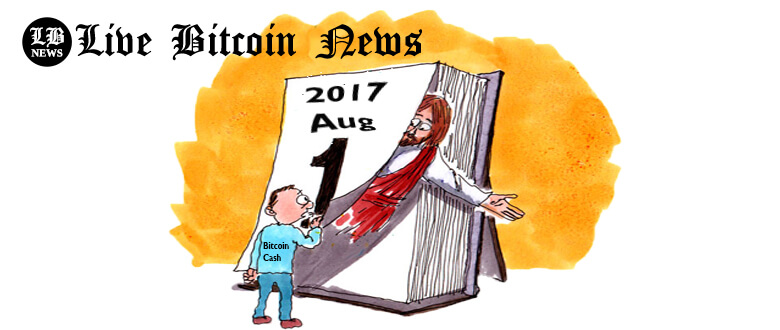On August 1st, at exactly 6:12 pm GMT, the first Bitcoin Cash block (block no. 478559) was mined by Viabtc’s miners, announcing the birth of Bitcoin Cash, the first ever cryptocurrency to be created by hard forking bitcoin’s blockchain. The new coin led to the birth of a new market that is worth more than $6 billion and each and every user possessing bitcoins was awarded an equal amount of Bitcoin Cash (BCC). So, now after more than 48 hours following the birth of Bitcoin Cash, what can we expect during the upcoming weeks?
The Birth of Bitcoin Cash
Almost a week before Bitcoin Cash was born, futures of the new currency were available for trading on a number of exchanges. Yesterday, BCC recorded a new high of $727 on Bitfinex, before falling down to $412 within less than 24 hours, at the time of writing of this article. Many market observers believe that BCC will attract much speculation and short term trading, yet whether or not the new altcoin can have long term support is still questionable at this early point.
The main issue with Bitcoin Cash is the relatively limited size of the network and the community providing the blockchain’s hash rate. Right now, there are 747 Bitcoin ABC nodes. Bitcoin ABC is a software implementation of Bitcoin Cash’s hard fork. This represents around 7.98% of the total number of bitcoin nodes which is currently estimated by around 9,357 nodes. Currently, the main hash rate supporting Bitcoin Cash’s network is provided by 2 pools; ViatBTC’s pool and bitcoin.com’s pool. The total hash rate provided by both pools is estimated by around 245 PH/s, which is around 3.9% of the total hash rate supporting bitcoin’s blockchain (6,414 PH/s).
What to Expect During the Upcoming Weeks?
The price of Bitcoin Cash has dropped to almost 50% of the high it recorded 24 hours following the birth of the coin. The blockchain is currently operating at a relatively slow speed. A total of 41 Bitcoin Cash blocks were mined since the hard fork took place. At a hash power of around 4% of bitcoin’s blockchain, transaction confirmation times along Bitcoin Cash’s blockchain often reach hours. This theoretically is expected to improve over time, due to the fact Bitcoin Cash’s protocol presents a novel difficulty algorithm that is designed to adjust according to the network’s hash rate. Nevertheless, it might need weeks before adjustment is completed and blocks are created at the expected 10 minute block intervals.
Bitcoin Cash is in its early days and needs many things if it is to survive and continue to hold its current value or even rise more;
1- The network’s hash rate has to rise. If a large proportion of bitcoin miners decide to start mining blocks on Bitcoin Cash’s blockchain, this will boost the network’s hash rate, shortening the confirmation times of transactions. The value of Bitcoin Cash as a new altcoin largely depends on the hash rate of the network.
2- More exchanges have to start listing Bitcoin Cash BCC. Currently, BCC is only available for trading, deposits and withdrawals on a handful of exchanges namely Bitfinex, Kraken, ViaBTC, HitBTC and Bittrex.
3- Bitcoin Cash has to prove that it can successfully mitigate the scalability problems of bitcoin, or else it would be nothing more but a new altcoin that did nothing but split bitcoin’s blockchain.



